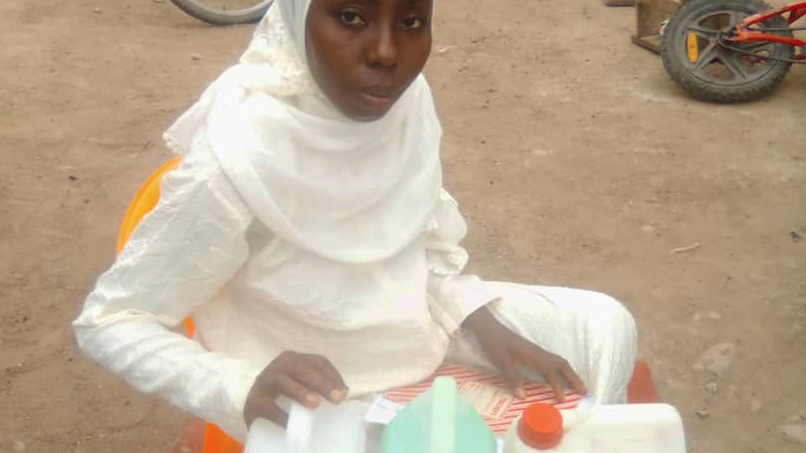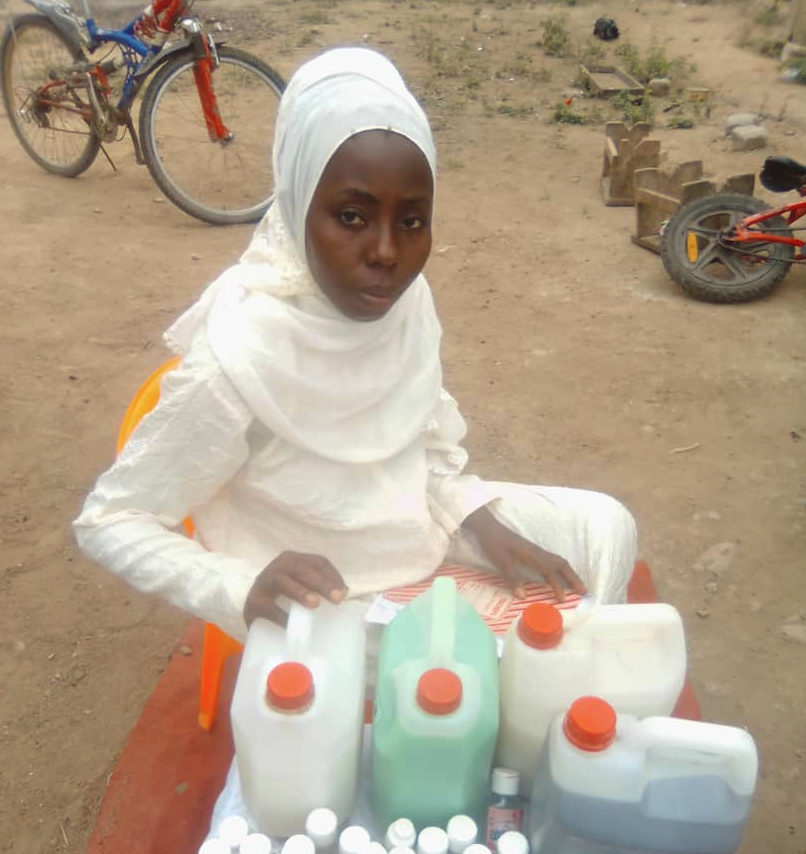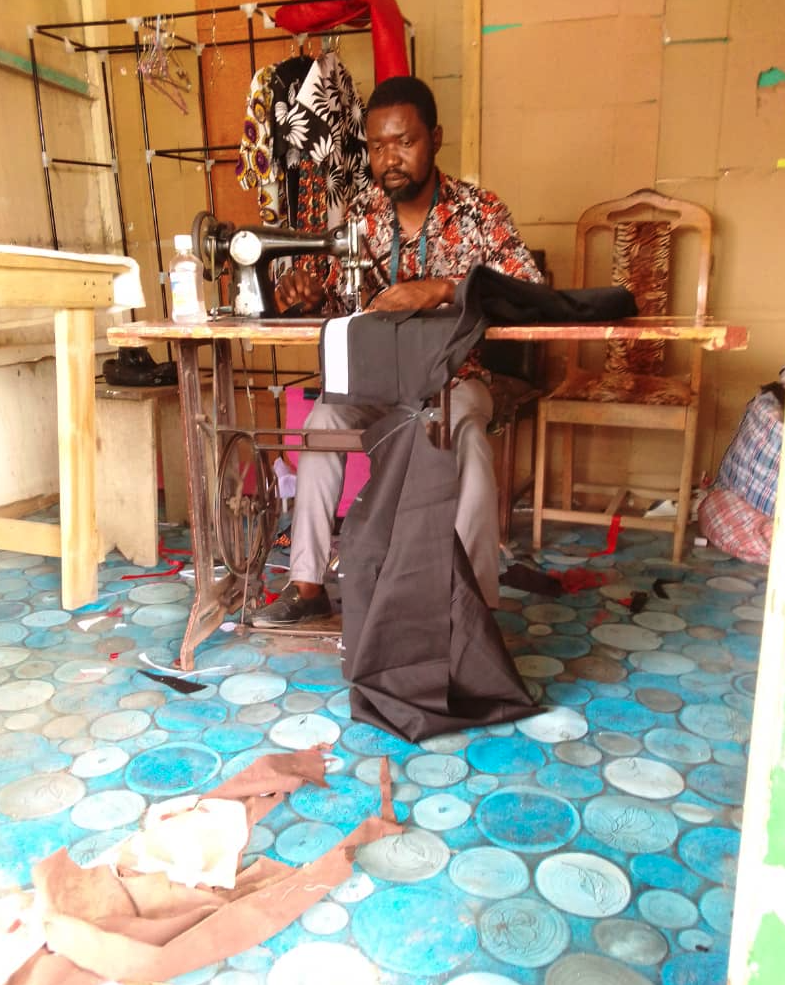AfriLabs’ scouts engage grassroots communities for impact in Africa
Ramon Michael
Oct. 13, 2020

How do you connect global resources to local communities to support recovery in a time of crisis? COVIDaction and AfriLabs partnered to ensure that technical support and financial assistance got to the last mile and other hard to reach communities. Using AfriLabs’ existing network of scouts, who are trained to identify promising social enterprises, the organisations are collaborating to ensure they expand their outreach to meet tech innovators across the continent and help them access opportunities they might not otherwise be aware of through conventional channels. Osasenaga Enogieru is one of the scouts in Nigeria, helping unearth local businesses combating the COVID-19 pandemic and connecting them with avenues for potential growth.

Sakina Ansah of Central Region, Ghana, showing her hand sanitiser and other detergent products, which are used in local hospitals.
One of the many organisations COVIDaction works with is AfriLabs, the largest network of African technology hubs, which serves as a magnet for investors, technologists, engineers, and entrepreneurs. With more than 200 centres spread across 47 countries on the continent, the organisation provides opportunities for thousands of people working at diverse intersections of innovation and industry.
AfriLabs does far more, however, than just providing locations to attract innovators; it is actively involved in discovering and encouraging talent wherever it may be. It has learned that these hub sites assist tech entrepreneurs, but physical meetings and outreach are also critical to understanding innovators’ needs. Enter the work of scouts; individuals skilled at finding and verifying micro, small, and medium enterprises (MSMEs), and ensuring that the most promising of them are supported. Over time, the network has aggregated a team of scouts who find out where people are using ingenuity and entrepreneurship to solve pressing problems. They then travel out to meet them and understand their organisation, extract core elements of their business, and position them for the best chance to receive the funding and support they need to grow.
“You set out to pursue a lead and end up being impressed with what you find but then you are introduced to someone who is doing something way more awesome and the cycle keeps revolving.”
Osasenaga Enogieru is based in Nigeria and has been working with AfriLabs since 2016 as a local scout for businesses. In recent times, he has been turning his skills to focus on work done in response to COVID-19. He granted us an interview by email to share the experience of this vital work.
The work of a scout can be unpredictable and enormously rewarding. “You set out to pursue a lead and end up being impressed with what you find but then you are introduced to someone who is doing something way more awesome and the cycle keeps revolving,” says Enogieru.
How scouting works
Most of the scouting is done via referrals to AfriLabs, but there is also a lot of personal outreach. “Typically you start with your contacts, put a post on Whatsapp asking for recommendations of people who are developing solutions and you get your first lead; a name and phone number with some product pictures,” Enogieru explains.
From this point where innovations are identified, details are verified, and it is decided whether an in-person visit would be beneficial. This takes into account the type of referral, how far away the location is, any travel restrictions, and the density of solutions in a given area. “There are hotspots for innovation across the 36 states in Nigeria,” says Enogieru. “So, regions like Lagos (the country’s commercial hub) and Abuja (the political center) have a high density of businesses providing solutions to combat COVID-19. Manufacturing hotspots in the Eastern parts of Nigeria are also scouted, but mostly we start with the hubs and centres and then spread out depending on the referral.”
When searching for smart opportunities, Enogieru keeps his eyes open for ideas that are 100% sourced and produced locally. “It’s interesting the sheer amount of local manufacturing that’s going on in Nigeria,” he says.
It is wrong to think that these are all small operations. In some cases, the leaders of these businesses are so busy, they find it hard to schedule a time to have a physical meeting. “One lead had to deliver 100k units of his product across two states within two weeks,” says Enogieru. “When you hear figures like this and learn about their growth stories, it raises the bar for your expectations a bit. In the early days, the focus was on a broad spectrum of COVID-19 innovations, but as we continued to work, I soon realised there was a need to be more specific as much of the data we were getting revolved around PPE.”
All in a day’s work
When heading out to meet the people whose businesses have pivoted to focus on COVID-19 response, Enogieru’s trip starts with plenty of preparation to make the most of a journey. “In the morning of a scouting day, typically I’ll have to ensure the targeted businesses are well aware of my visits, I also send them sample questions and areas of interest I will want to know about when I get there,” he says. “I check the weather forecast and any possible change in travel regulations to that area. Typically for locations scouted were within an hour or so drive from my start point — at the most two hours — and the interviews typically take about 45 minutes to an hour per business so they can be wrapped up just in time to visit another location. I try to visit locations that have a cluster of businesses to make the most of my time.” These trips are often followed up with a call to confirm any outlying details.
The solutions that Enogieru has already covered are broad and varied. So far, he has spoken to innovators making sanitisers, disinfectant tunnels, handwash stations, hazmat suits, face shields, and other medical PPE. “One of the experiences I found to be most inspiring was a disinfectant tunnel (an area people can pass through outside of a building or place and be sprayed with a disinfectant) maker. The producer had to pivot from producing other medical PPE, which they had already been making before the pandemic hit. The company managed to switch to making these heavy-duty disinfectant machines to help curb the spread, which took a lot of work and logistics on their part.”
“One of the many things I love about this work is that I am meeting people who are creating change in their community.”

John Botwe of Assin Foso, Ghana, who has recently pivoted to sewing nose masks. Seen above sewing male garments.
From Edo State to helping support agents of change
Working as a scout not only offers ways for businesses to work with the AfriLabs community, it also means that Ossasenga Enogieru gets to know some of the country’s best innovators. “One of the many things I love about this work is that I am meeting people who are creating change in their community. Prior to visiting them, you have a perception of who they are and you assume that these are people you are trying to provide support to; however, you get to know them and realise that they are thought-leaders within their communities, people of repute, and an agent of change in their local area.”
Enogieru was born in Edo State in southern Nigeria. He relocated to a town near Abuja in 2014 and opened a restaurant. Unfortunately, the business did not last. It was shut down, and he found himself in debt and living on the streets. With determination, he learned from his experience and managed to find work again to elevate his position, but this time, he decided to share his lesson. “I noted the sheer number of people who were not as fortunate as me to get back on track, so I decided to dedicate my course to helping people, especially younger people, not make the same mistakes I made. Four years and counting at AfriLabs, and I’m really proud of the number of people who came in through our doors broken and vulnerable, some have not had a decent meal in days but in six months to a year, they are creating jobs for other youths.”
From life on the streets to changing the fortunes of people working on a response to a pandemic, Osasenaga Enogieru has become a vital part of a vast network of innovation in Nigeria. “In all, it’s really exciting,” he says. “The experience in itself is incredibly worthwhile — meeting new people, learning about better ways of creating impact in communities, and seeing people taking charge of their lives. In the end, it’s not about the number of places visited or the stipends provided that makes it worth it, in the end, it’s who you become.”
The COVIDaction Local Production Local Solutions team is proud to be working with Osasenaga and AfriLabs. The global response to the needs of this pandemic has emerged across sectors and scales. The speed at which informal innovators have pivoted to critical products for their local communities, has been just as important as the work of established industries. Only with the help of AfriLabs have we been able to make contact with these small scale producers who we would not have reached with our online media campaigns. With the work done by the AfriLabs scout team across eight countries, we now have an exciting pool of 500+ applications, which are continuously being reviewed by our expert panels. We are also working tirelessly to build our funding resources to enhance our ability to support as many of these as possible, as there are so many deserving entries and so much missing capacity across Africa. We look forward to working side by side to explore innovation that will bring relief and recovery on the continent as it faces COVID-19.
This blog post first appeared on https://medium.com/covidaction/local/home
